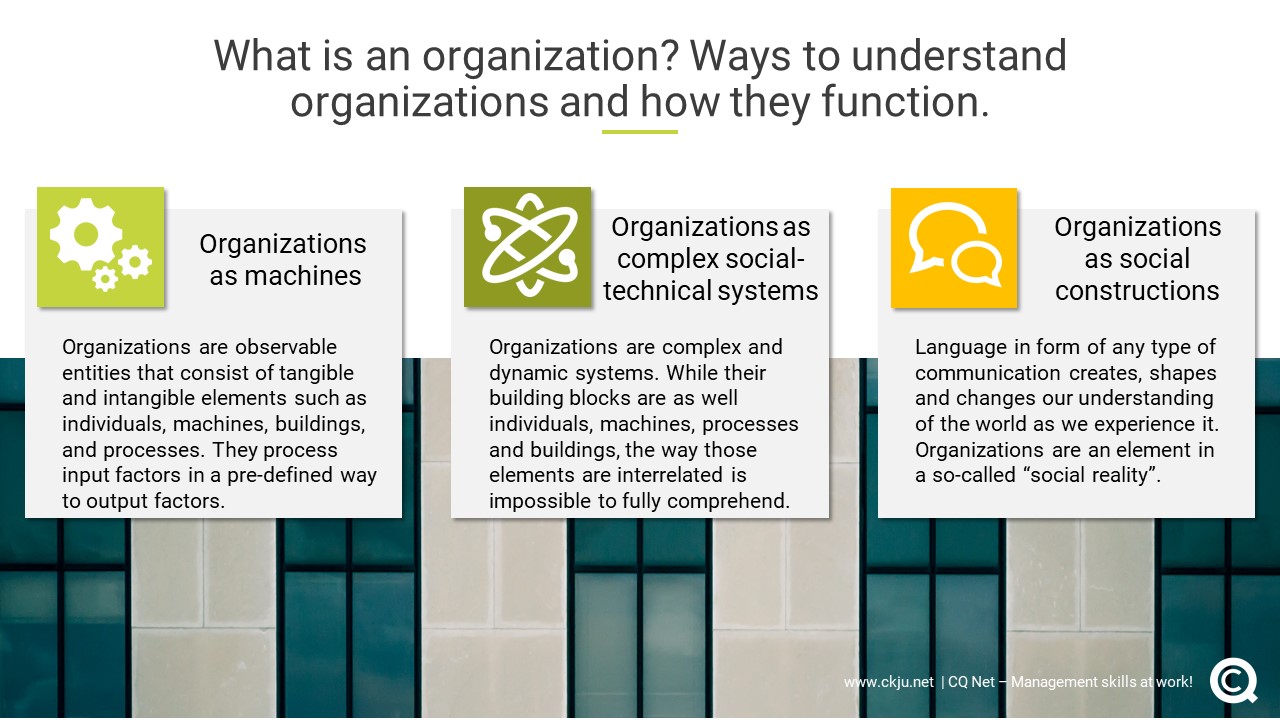- Blog
- What is an organization?
Contents
The very basis of navigating in an unknown environment is to make oneself comfortable with its characteristics. This especially applies to organizations which have a profound impact on our professional life.Dr. Markus Nini
However, most of us take it for granted that organizations exist and don`t question what they are and how they work. As professionals we plan, organize, communicate, and manage on a daily basis assuming that we know how our activities impact the organization. This is a rather courageous approach which sometimes succeeds. In many cases however, we don`t achieve what we expected to achieve and don`t really understand why things didn`t work out as planned.
The very basis of navigating in an unknown environment is to make oneself comfortable with its characteristics. This inevitably leads to the questions what an organization is and how it works as the very foundation of any management intervention. Unfortunately, there is no simple answer to this question but a set of different ones. Depending on which one you choose, it provides you valuable insights into how organizations work.
We will have a look at three different ways to understand organizations, what they are and how they work:
- Organizations as machines
- Organizations as complex social-technical systems
- Organizations as social constructions
Going through each of them we will address their characteristics and derive recommendations for professionals like you.
Organizations as machines
One of the most prominent ways to understand organizations is the so-called machine metaphor (Wiener, 1961). It is based on the understanding that organizations are observable entities that consist of tangible and intangible elements such as individuals, machines, buildings, and processes. Following this internal logic, organizations as machines process input factors in a pre-defined way to output factors.
As with any type of machine, organizations can be controlled and steered by pushing the right button and pulling the right lever. Thus, the organization’s reaction to any kind of management intervention is predictable and be planned upfront.
Examples of management interventions that rely on the machine metaphor include top-down driven financial planning processes, planned change initiatives, and traditional problem-solving activities.
- Simple and easy to understand way to grasp organizations
- Provides the foundation of many well-defined management interventions
- Enables professionals to plan and predict how organizations react to their actions
- Oversimplifies the real dynamics taking place in organizations
- Many management interventions that rely on the machine metaphor don`t live up to their promises
- Fosters overconfidence in the ability to control and steer organizations
Organizations as complex and dynamic systems
Progress in organizational science and the limits of the machine metaphor has led to a new way of understanding organizations. This new way assumes that organizations are complex and dynamic systems. While their building blocks are as well individuals, machines, processes and buildings, the way those elements are interrelated is different.
In contrast to the machine metaphor, the internal logic that defines how those elements relate to each other is complex, dynamic and thus impossible to fully comprehend (Luhmann et al., 2013). Consequently, it is hard control and steer organizations with simple cause-effect management interventions. The fact that this internal logic changes over time makes it even harder to predict how an organization is going to respond to a specific management intervention.
The way to understand organizations as complex and dynamic systems has gained popularity in recent years. So do management interventions such as organizational agility, complexity leadership and alternative change management models (e.g. field configuring events).
- Takes into consideration the complexity and dynamics of organizations in a VUCA environment
- Emphasizes the limits of management interventions in terms of plannability and predictability
- Gives rise to a set of new management interventions that account for unintended consequences
- Is rather abstract and makes it hard to derive practical management interventions
- Requires a basic understanding of systems theory and complexity theory
- Applies to a system level rather to individual elements that constitute organizations
Organizations as social constructions
The third way of understanding organizations goes even one step further and rejects the assumption that organizations are physical entities. Instead, it puts the social realm first and positions language as the force that creates and maintains organizations.
The role of language in shaping what we see and believe has a long tradition in social sciences (Berger and Luckmann, 1966). This has led to an understanding of organizations as social constructions. More specifically, language in form of any type of communication creates, shapes and changes our understanding of the world as we experience it. As a consequence, organizations are nothing more than an element in a so-called social reality.
Management practitioners and organizational scholars have adapted this way of understanding organizations as social constructions In the last couple of years. This opens-up a new language and communication centric perspective into how organizations function (e.g Alvesson and Karreman (2000; Grant and Marshak). Interestingly, current discussions about alternative facts, fake news and social media bubbles rely on a similar framework of some a communication driven social reality.
In practice, the understanding organizations as social construction is the foundation of a set of new and powerful management interventions. Examples include practice-based approaches such as strategy as practice and leadership as practice (Carroll et al., 2008). In addition, it provides valuable insights into how one can use language to initiate, shape or inhibit change initiatives.
- Emphasizes the relevance of communication as one of the most powerful management tools available
- Provides valuable insights into how to use communication to shape social reality
- Is a good fit to the way of understanding organizations as complex and dynamic systems
- Is rather abstract and makes it hard to derive practical management interventions
- Does neglect the tangible elements of organizations
- Can be used as framework to manipulate people with communication
There is no easy and one size fits all answer to what organizations are and how they work. However, the ways of understanding organizations as machines, complex systems or social constructions provides some valuable answers to those questions. In addition, it opens-up options how to control and steer organizations you might not have had in mind yet.
References and further reading
Alvesson, M. and Karreman, D. (2000) ‘Varieties of Discourse: On the Study of Organizations through Discourse Analysis’, Human Relations, vol. 53, no. 9, pp. 1125–1149.
Berger, P. L. and Luckmann, T. (1966) The social construction of reality: A treatise in the sociology of knowledge [Online], New York, Anchor Books.
Carroll, B., Levy, L. and Richmond, D. (2008) ‘Leadership as Practice: Challenging the Competency Paradigm’, Leadership, vol. 4, no. 4, pp. 363–379.
Grant, D. and Marshak, R. J. (2011) ‘Toward a Discourse-Centered Understanding of Organizational Change’, The Journal of Applied Behavioral Science, vol. 47, no. 2, pp. 204–235.
Luhmann, N., Baecker, D. and Gilgen, P. (2013) Introduction to systems theory.
Wiener, N. (1961) Cybernetics, or control and communication in the animal and the machine (2nd ed.), Cambridge, MIT Press.
Top Rated
About the Author

Comments
Most Read Articles
Blog Categories
RELATED SERVICES










Add comment